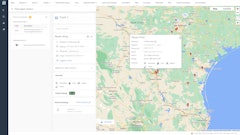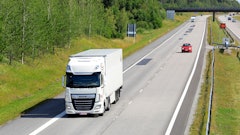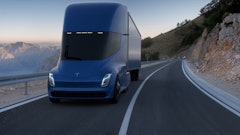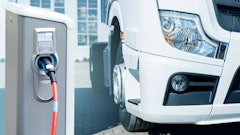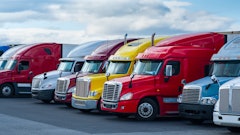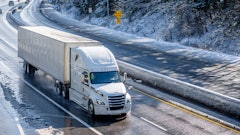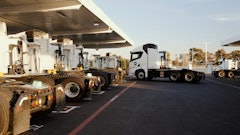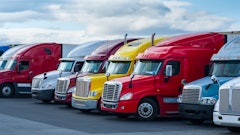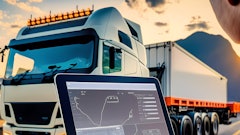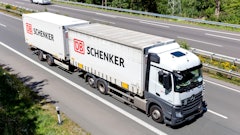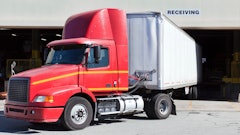Preliminary field tests of diesel-electric hybrid engines in parcel delivery and utility line repair trucks have yielded fuel savings of 40 percent to 60 percent, and the technology holds particular promise for trucking operations with frequent starts and stops, significant idle time and a need for exportable power, particularly food and beverage delivery, according to many trucking industry insiders.
"I do not think that all fleets will get results that high," says Bill Van Amburg, senior vice president of WestStart-CalStart, a California-based non-profit organization that works with the public and private sectors to develop advanced transportation technologies, foster cleaner air and lessen U.S. dependency on foreign oil. "Savings of 20 percent to 30 percent are probably more likely.
"These early results are very promising. While we need to test these trucks on a larger scale and over a longer period of time, we continue to see indications that these vehicles are commercially viable and will deliver real value to customers," he says.
All the major truck and engine component manufacturers are working on hybrid technology right now, and many are running limited pilots with a handful of companies, but, if all goes well, the first commercially available models could hit dealers towards the end of this year or early next year.
International Truck and Engine Corp., Warrenville, IL, hopes to be the first to market, with between 100 and 200 hybrid trucks as early as the winter.
Other truck and engine manufacturers are expecting to have hybrid electric vehicles (HEVs) available over the next three years. Paccar, makers of the Peterbilt and Kenworth truck brands, plans to begin production of a hybrid truck by 2008. Swedish truck maker Volvo plans production in 2009. Japanese truck makers Hino, Mitsubishi-Fuso and Nissan are all field testing hybrid trucks in Japan this year before making them available to the U.S. market.
In those trials, Mitsubishi's medium-duty cabover diesel/electric hybrid, called the Canter Eco Hybrid, has achieved as much as a 30 percent increase in fuel efficiency.
"The Mitsubishi Fuso Canter Eco Hybrid demonstrates the potential for combining environmental performance and efficiency in an alternative drive vehicle," says Bob McDowell, president and CEO of Mitsubishi Fuso Truck of America (MFTA), headquartered in Logan Township, NJ. "This vehicle shows the technological capabilities and environmental dedication associated with the Fuso brand."
In similar tests, Nissan's Atlas 20 Hybrid showed between 15 percent and 35 percent improvements in fuel economy in city driving situations. The vehicle's carbon dioxide emissions are 25 percent less than conventional trucks.
To date, most of the testing of hybrid truck technology in the United States has occurred in the parcel delivery and utility industries, but some testing of hybrid vehicles is already underway in a number other markets, including city buses and refuse collection. Retailers and manufacturers in the food and beverage industry have been following developments closely, and a handful of them are just now starting to seek out pilot programs for their light- and medium-duty delivery vehicles.
Among those that have expressed an early interest are Coca-Cola, Schwan's, Wal-Mart, Danone Waters, Nestle Waters Group (Perrier), PepsiCo, Yosemite Waters, Safeway and Kroger. Coke started a trial involving a 4000-Series International truck with hybrid components from Eaton Corp., Cleveland, in September 2004.
Wal-Mart, in keeping with a company goal of reducing greenhouse gas emissions by 25 percent, has plans to double new truck efficiency by 2015. The nation's largest retailer has already put more than 100 hybrid vehicles into operation in its light-duty fleet and has requested another 100 for introduction in 2007.
"We support hybrid vehicles because they are more fuel-efficient, create less air pollution and owning one is an investment in restorative change," a company spokesperson says. "These innovations are good not only for the environment but also for business. We expect they will produce net savings of at least $494 million a year by 2020, and more in later years."
PepsiCo's Frito-Lay division is set to begin field testing two hybrid electric delivery vehicles in the fall. The company, which is based in Plano, TX, is working with state environmental officials in Texas on the pilots, which will involve class-2 International delivery vans with a maximum gross volume weight of 14,000 pounds. Eaton and Vancouver-based Azure Dynamics are providing the hybrid technology.
The pilot vehicles will be used on several of Frito-Lay's direct store delivery routes in Texas, according to Pete Silva, director of fleet procurement at PepsiCo.
"We'd like to learn about the fuel efficiency and economy and decreased emissions of hybrids to help us figure out what we want to do with our fleet down the line," says Silva.
Mark Federle, Azure's vice president of sales, says the program with Frito-Lay "represents another step in our path to commercializing hybrid drive technology into major truck fleets in North America. We are confident we can deliver a product which will be both economic and environmentally sound and that more businesses will follow."
As the positive results continue to unfold, Van Amburg expects to see widespread adoption of hybrid technology in the food industry over the next few years. He expects thousands of hybrid delivery vehicles to be on the road by 2010.
"There are several truck classes where it will work and fit into the food industry," he says, "like step-in vans and light- and medium-duty trucks.
"In the food industry, you can expect to see them in regional deliveries, store-to-store deliveries, direct-to-store deliveries and warehouse-to-warehouse movements," Van Amburg continues. "There is some real tremendous opportunity, probably not when you're doing long-hauls across the country, but certainly in local deliveries with a lot of stops."
Slow Starter
Hybrid technology has been in development in the trucking industry for a number of years, but has never really taken off until now. Part of the reason for the slow interest has been the higher cost of hybrid vehicles, but with high fuel prices and growing pressure to reduce diesel emissions, even the higher incremental costs of hybrid vehicles seem cheaper by comparison.
To help offset the higher sticker price, federal tax credits of up to $12,000 under the Energy Policy Act of 2005 are available for the purchase of new hybrid trucks that will achieve at least 50 percent better fuel economy than current trucks. In some parts of the country, companies that purchase hybrid trucks may also qualify for local, regional or state incentives.
"When you combine the high cost of diesel with potential maintenance savings and tax incentives, the business case for hybrid-electric vehicles is becoming more and more favorable," says Tom Cellitti, vice president and general manager of International's Medium Vehicle Center.
"Now is the time because of fuel costs and other issues," adds Van Amburg, who also notes that other technologies, such as auxiliary power units, are widely available to cut fuel consumption.






